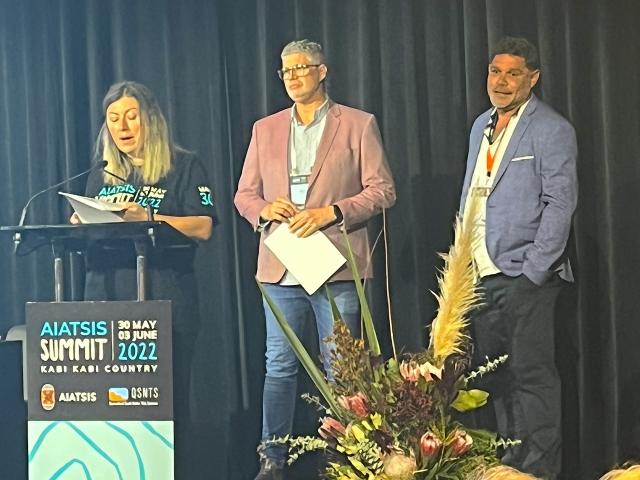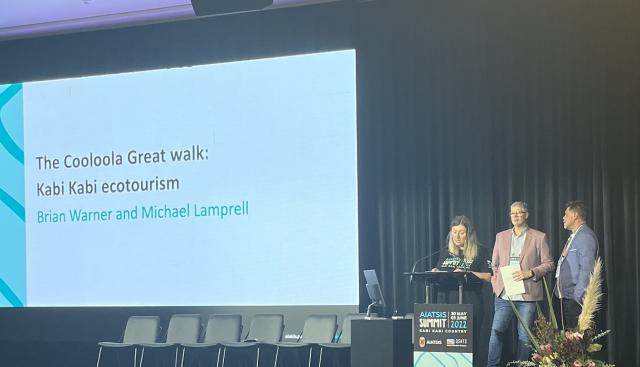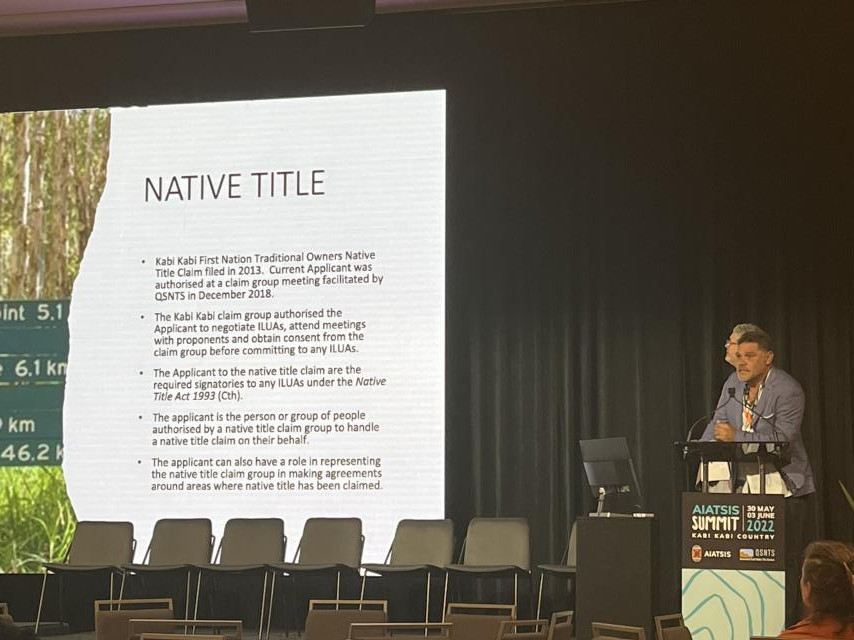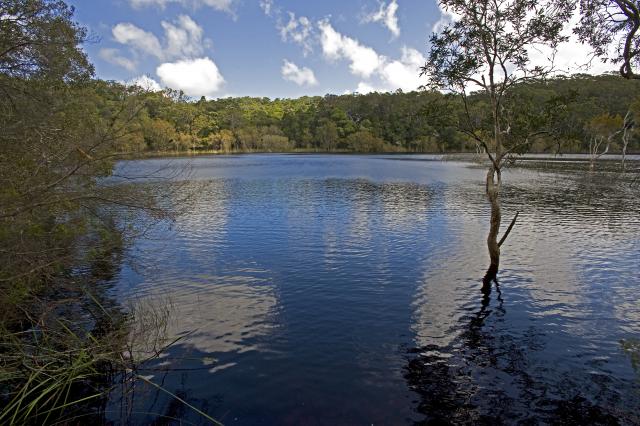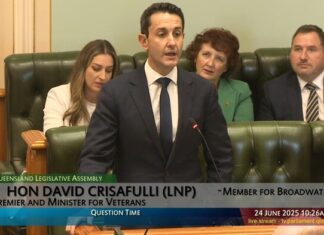A presentation on Mabo Day last week should have been a celebration of a project that has the potential to become our greatest example of Native Title in action. Instead many people left the room scratching their heads about the future of the Cooloola Great Walk, and wondering whether beautiful Poona Lake would be closed to walkers.
Others, however, told Noosa Today they left with “a sense of cautious optimism”, saying that out of the confusion, “It will become clear that Kabi Kabi’s Native Title right to co-manage Cooloola alongside Queensland Parks and Wildlife Service will produce a more principled and effective management than is currently the case”.
The presentation on the last day of the highly successful, week-long Australian Institute of Aboriginal and Torres Strait Islander Studies Summit at Sunshine Coast Conference Centre, was by Kabi Kabi Native Title applicant Brian Warner and proponent Michael Lamprell, whose company CABN, following the state government calling for expressions of interest in 2019, was chosen to develop the commercial Great Walk ecotourism project in partnership with Kabi Kabi and build the required infrastructure in the Cooloola section of the Great Sandy National Park.
This was the first time that these two key figures in the Great Walk project had spoken publicly about its progress, its future and the development of a ground-breaking partnership between the Kabi Kabi First Nations and the ecotourism business sector, and, not surprisingly, there were as many stakeholders in the audience as conference delegates. And while some of those clearly felt satisfied to learn about the spirit of co-operation between the parties, others were surprised to learn that some of the most basic elements, such as finalising the locations of the five glamping campsites to be built on national parkland, were still being negotiated.
But a confusing aspect of the presentation was Mr Warner’s revelation that all of the surrounds of Poona Lake, one of the jewels in Cooloola’s crown, part of which is a Kabi Kabi women’s sacred site, would be declared a restricted access area.
Pointing out that Kabi Kabi had the right under the Queensland Cultural Heritage Act to seek restricted access to areas of important cultural significance, he said: “We could go and get 15 restricted access areas declared, and build infrastructure on those sites. We could do it that way, but have we given it consideration?
“No, because we don’t have to do it that way to have Indigenous areas, so we’re going through this process.
“Double Island Point will have a restricted access area so our people can stay there and go camping.
“At Poona Lake, a restricted access area is now going to be encircled around the whole lake. We had a park for visitors to go to, but that won’t occur now, it will be around the entire area, and I think that’s a good thing.”
While confirming that Kabi Kabi would exercise their right to a final say over what happens on Kabi Kabi country, Warner also revealed other planned constraints over park use.
“We still have to listen to our stakeholders on this but the great thing is that when we’ve done that, it will be the Kabi Kabi who make the decisions.
“I want to reduce petrol motors going up the river past Kinaba Information Centre. People complain that this project is going to increase foot traffic on the Walk. It’s not.
“What’s doing the damage is four-wheel-drive traffic going up Teewah Beach right over the shells that show our history, our occupation.
“I’d like to reduce that traffic. If something doesn’t give, it’s going to be destroyed.”
The 45-minute presentation, titled The Cooloola Great Walk: Kabi Kabi Ecotourism, also presented an effective multi-media look at the Great Walk’s history and the hopes and aspirations for it.
“The way [CABN] approached this before being selected was to go through a series of meetings with state government and Kabi Kabi and other stakeholders, so it was a collaborative process from the start and has been the whole way,” Michael Lamprell said.
“Early on we decided that for us to enter into this legitimately and authentically, we needed to find out more about the people we would go on the journey with, so we asked if we could spend time on country with the Kabi Kabi.
“It was for us to listen and learn, to make sure our values aligned and that we could add to what they were doing, to make sure it was the right fit.”
Although in the environmental community, fears have been expressed about the footprint of CABN’s proposed glamping sites, and more generally about the concept (new to Queensland but not to other parts of Australia) of commercial tourism operations on national park land, Brian Warner and Kabi Kabi elders, such as Aunty Cecilia Combo and Uncle Mick Douglas, clearly believe the fit is right.
Both Warner and Lamprell repeatedly spoke about the “collaborative approach” between all stakeholders, but most particularly between CABN and Kabi Kabi who will be equal partners in the construction and operation of the Cooloola Great Walk for an unspecified period before CABN will “phase out” in favour of the Traditional Owners.
But all of this is contingent upon the signing of an Indigenous Land Use Agreement (ILUA), which is still in negotiation between the state and the Kabi Kabi.
Clearly the protracted negotiations over this and community divisions (within the Kabi Kabi as well as in the broader community) have taken their toll on both Warner and Lamprell.
At the AIATSIS Summit they should have looked celebratory but instead they looked exhausted, no doubt after a week of behind-the-scenes meetings.
At one point Warner sighed: “If Covid hadn’t come this project would have been finished a couple of years ago. Apart from finalising the campsites my job is done. Then it will be time for our people to decide.”
It was easy to feel empathy with Warner’s apparent exasperation.
He is a passionate man who feels deeply for country and has been in the frontline on the Native Title claim and now the Great Walk for eight years.
He wants resolution on both, but only on legitimate terms, which are that Kabi Kabi have the right under Native Title, recognised by the state government when it initiated the commercial Great Walk project, to decide upon, and participate in, a commercial tourism enterprise that includes commercial accommodation within the park.
Lamprell was more upbeat when outlining the participation agreement with Kabi Kabi.
“What is really important to us about the partnership we’ve been building with the Kabi Kabi over the past three years is to make sure we’re all happy with the short and long term benefits of the participation plan. While we’re still negotiating the ILUA, if the partnership and the project are agreed upon, the participation plan we’re working on sits under a company where Kabi Kabi and CABN are both shareholders, and that will be the company that delivers the Cooloola Great Walk.”
Lamprell compared the potential of the Great Walk with the Northern Territory’s Larapinta Trail and other iconic trails around Australia.
He also revealed a new partnership with Intrepid Travel, the largest adventure travel company in the world, “but more importantly, they’re a people before profit company”.
He concluded: “If we do this well, and I’m confident that we can, this sets a platform for Kabi Kabi for a whole other realm of opportunity to build capacity and get more people back on country.”
While the Mabo Day presentation fell short of delivering a clear road map to completion of the Great Walk, it did explain a great deal about the complexity of the project, and the importance of its success as a landmark for future collaborations when Kabi Kabi Native Title is granted next year.
In a statement to members on Monday, Noosa Parks Association president Darlene Gower, who attended the presentation, said: “This was the first time that these two key figures [Warner and Lamprell] … have spoken publicly, so I am pleased to now share this information.
“The final siting of the five Great Walk accommodation sites is still being decided.
“Kabi Kabi peoples will be making the decision on the final sites. Kabi Kabi peoples are committed to using their Native Title rights to better manage 4WD numbers and driver behaviour on Teewah Beach, and prevent fossil fuel powered boats using the Upper Noosa River upstream of the Kinaba information centre.
“Kabi Kabi peoples will be introducing a Restricted Access Area (RAA) at Double Island Point for a Kabi Kabi people’s camping ground and a strip of land around the perimeter of Lake Poona.
“The proposed RAA at Double Island Point has been on the public record for some time, however, its intended use was unknown until this announcement. The proposed RAA at Lake Poona was a surprise to NPA, and its purpose is unknown.”
Ms Gower’s report concluded: “From the get-go, NPA has accepted and respected Kabi Kabi peoples’ Native Title right, along with the State, to decide the nature of a commercial Cooloola Great Walk.
“Slowly but surely, Kabi Kabi peoples and the State are respecting NPA’s advocacy on modifying site selection at Lake Poona and the Upper Noosa River.
“NPA is now cautiously optimistic that a joint State Government-Kabi Kabi peoples’ announcement on sites will be made by the end of August. Regarding the restriction around the whole of Lake Poona, NPA will now focus its advocacy on ensuring the lake remains accessible to all walkers.”
Noosa MP Sandy Bolton, who was also in attendance, told Noosa Today after the presentation that while it had touched on Poona and Noosa River site relocations, confirmation of the alternate sites, as well reduction of size of the Double Island Point site had yet to be provided.
“Today delivered really good news, however, clarification from Kabi Kabi on the Poona Restricted Access Area is required, as one of the early criteria set for this project was that any environmental and site concerns would be addressed, as well as existing access for natural walkers be retained, which was not apparent on what was shown.
“It has been a long process with a way to go, and while the partnership between government, CABN and Kabi Kabi is important, ultimately it is the relationships within our own community and our First Nations people that is vital in protecting our environment while establishing our future together.”

